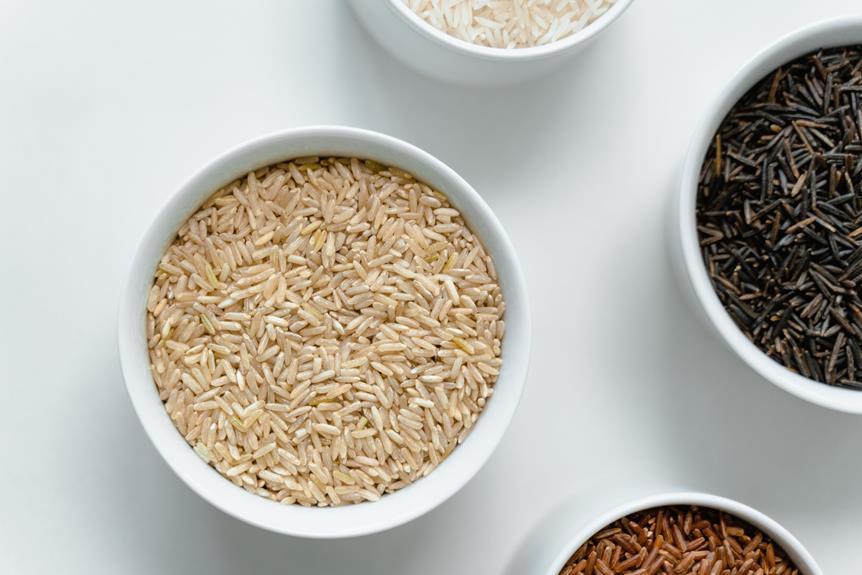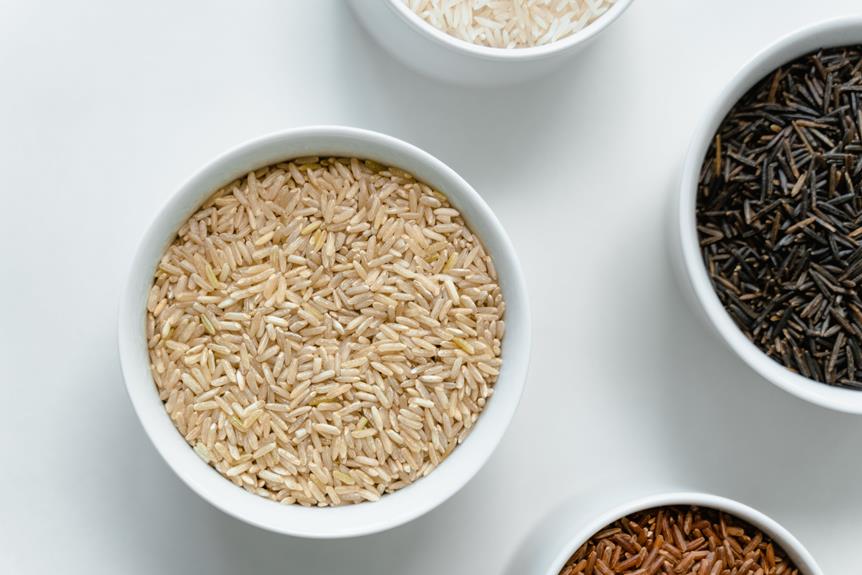Imagine your gut as a well-oiled machine, with each part working harmoniously to keep you healthy and thriving. Now, picture dietary fiber as the key ingredient that keeps this machine running smoothly. From improved digestion to a reduced risk of constipation, the benefits of dietary fiber for your gut health are truly remarkable. But that's not all; there's so much more to discover. So, why not embark on this journey with us as we unravel the five best gut health benefits that dietary fiber has to offer? Get ready to discover how fiber can revolutionize your gut health and improve your overall well-being.
Key Takeaways
- Improved digestion and prevention of constipation through natural bulking and gut bacteria support.
- Reduced risk of digestive disorders like hemorrhoids and diverticulosis through regular bowel movements and balanced gut microbiota.
- Enhanced nutrient absorption and regulation of blood sugar levels for optimal digestive system function.
- Overall digestive health benefits including improved gut bacteria growth, weight management, and immune function.
Improved Digestion
Improving your digestion is one of the key benefits of dietary fiber. By incorporating fiber-rich foods into your diet, you can ensure that your digestive system functions optimally. How does fiber achieve this? Well, fiber acts as a natural bulking agent, adding bulk to your stool and making it easier to pass through your intestines. This helps to prevent constipation and promotes regular bowel movements.
Furthermore, dietary fiber enhances the health of your gut by promoting the growth of beneficial bacteria. These bacteria, known as probiotics, play a crucial role in maintaining a healthy balance in your gut microbiome. They aid in the breakdown of fiber, producing short-chain fatty acids that provide nourishment to the cells lining your intestines. This, in turn, strengthens the integrity of your gut lining, reducing the risk of leaky gut syndrome and other digestive disorders.
In addition to promoting regularity and supporting gut health, fiber also aids in the prevention of hemorrhoids. Hemorrhoids are swollen blood vessels in the rectal area that can cause discomfort and pain. By softening your stool and preventing constipation, fiber reduces the strain on your rectum during bowel movements, thus reducing the likelihood of developing hemorrhoids.
To reap the benefits of improved digestion, aim to consume a variety of fiber-rich foods such as fruits, vegetables, whole grains, and legumes. Incorporating these foods into your meals and snacks will provide your body with the necessary fiber to support a healthy digestive system.
Reduced Risk of Constipation
To further support a healthy digestive system, incorporating dietary fiber into your diet can help reduce the risk of constipation. Constipation is a common condition characterized by infrequent bowel movements and difficulty passing stool. It can be caused by various factors, including a lack of dietary fiber. By including fiber-rich foods in your diet, you can promote regularity and prevent constipation. Here are three ways in which dietary fiber can help reduce the risk of constipation:
- Softens stool: Dietary fiber adds bulk to your stool, making it softer and easier to pass. It absorbs water in the intestines, which helps to soften the stool and prevent it from becoming hard and dry. This promotes regular bowel movements and reduces the strain and discomfort associated with constipation.
- Increases stool frequency: Fiber-rich foods, such as fruits, vegetables, and whole grains, contain insoluble fiber that adds bulk to your stool. This can stimulate the muscles in your intestines and promote more frequent bowel movements. By increasing the frequency of bowel movements, dietary fiber helps to prevent constipation.
- Supports healthy gut bacteria: Dietary fiber acts as a prebiotic, providing nourishment for the beneficial bacteria in your gut. These bacteria help to break down and ferment fiber, producing short-chain fatty acids that promote bowel regularity. By supporting a healthy gut microbiome, dietary fiber can help prevent constipation and maintain a healthy digestive system.
Enhanced Nutrient Absorption
Incorporating dietary fiber into your diet enhances nutrient absorption, ensuring that your body can make the most of the essential vitamins and minerals it needs. Fiber acts like a sponge in your digestive system, soaking up water and creating a gel-like substance that helps slow down the digestion process. This slow digestion allows for better nutrient absorption in the small intestine.
One of the key ways that fiber enhances nutrient absorption is by increasing the surface area in the intestines. Fiber adds bulk to the stool, which helps to stretch and expand the walls of the intestines. This expansion increases the contact between the nutrients and the intestinal walls, allowing for more efficient absorption.
Additionally, dietary fiber helps to regulate blood sugar levels. When you consume fiber-rich foods, they slow down the release of sugar into the bloodstream. This prevents sudden spikes in blood sugar levels, which can lead to insulin resistance and hinder nutrient absorption. By maintaining stable blood sugar levels, fiber ensures that the body can utilize the nutrients effectively.
Furthermore, fiber acts as a prebiotic, providing nourishment for the beneficial bacteria in your gut. These bacteria play a crucial role in nutrient absorption by breaking down certain components of food that your body is unable to digest on its own. By promoting a healthy gut microbiota, fiber supports optimal nutrient absorption.
Incorporating dietary fiber into your diet is an effective way to enhance nutrient absorption. By increasing the surface area in the intestines, regulating blood sugar levels, and supporting a healthy gut microbiota, fiber ensures that your body can make the most of the essential vitamins and minerals it needs. So, make sure to include fiber-rich foods like fruits, vegetables, whole grains, and legumes in your daily meals for improved nutrient absorption.
Balanced Gut Microbiota
When it comes to maintaining a healthy gut, a balanced gut microbiota is crucial. Your gut is home to trillions of bacteria, fungi, and other microorganisms that make up your gut microbiota. These tiny organisms play a significant role in your overall health and well-being. Here are three reasons why a balanced gut microbiota is essential:
- Improved digestion: A diverse and balanced gut microbiota helps break down food and absorb nutrients more efficiently. When your gut microbiota is imbalanced, it can lead to digestive issues such as bloating, gas, and constipation. By promoting a healthy balance of bacteria in your gut, dietary fiber can help improve digestion and prevent these uncomfortable symptoms.
- Enhanced immune function: Your gut microbiota plays a vital role in supporting your immune system. A balanced gut microbiota helps regulate immune responses and protects against harmful pathogens. By consuming an adequate amount of dietary fiber, you can promote a healthy balance of gut bacteria, which in turn enhances your immune function and reduces the risk of infections.
- Mental well-being: Emerging research suggests a strong connection between the gut and the brain, known as the gut-brain axis. A balanced gut microbiota is believed to influence brain function and mental health. By consuming dietary fiber, you can support a healthy gut microbiota, which may positively impact your mood, reduce stress, and improve overall mental well-being.
Lowered Risk of Digestive Disorders
Consuming an adequate amount of dietary fiber can significantly lower your risk of developing digestive disorders. Fiber plays a crucial role in maintaining a healthy digestive system and preventing various gastrointestinal issues. By including fiber-rich foods in your diet, you can promote regular bowel movements and reduce the chances of developing conditions such as constipation, hemorrhoids, and diverticulosis.
One of the primary benefits of dietary fiber is its ability to prevent constipation. Fiber adds bulk to your stool, making it easier to pass through your digestive tract. This helps prevent the buildup of waste material in your colon, reducing the risk of constipation and the associated discomfort. Additionally, consuming a sufficient amount of fiber can prevent hemorrhoids, which are swollen blood vessels in the rectum or anus that can be caused by straining during bowel movements.
Another digestive disorder that can be prevented by consuming dietary fiber is diverticulosis. This condition occurs when small pouches form in the lining of the colon. These pouches can become inflamed or infected, leading to diverticulitis. By consuming an adequate amount of fiber, you can prevent diverticulosis by promoting regular bowel movements and preventing the formation of these pouches.
Incorporating fiber-rich foods into your diet is essential for maintaining a healthy digestive system and reducing the risk of digestive disorders. Foods such as fruits, vegetables, whole grains, and legumes are excellent sources of dietary fiber. Aim to consume at least 25-30 grams of fiber per day to reap the benefits and lower your risk of developing digestive problems. Remember, prevention is key, and a high-fiber diet can go a long way in keeping your digestive system healthy and functioning optimally.
Frequently Asked Questions
How Much Dietary Fiber Should I Consume Daily to Promote Gut Health?
To promote gut health, you should aim to consume an adequate amount of dietary fiber daily. While the specific amount may vary depending on factors like age and sex, a general guideline for adults is around 25-30 grams per day. Including high-fiber foods like fruits, vegetables, whole grains, and legumes in your diet can help maintain a healthy digestive system. Remember to drink plenty of water, as fiber works best when paired with proper hydration.
Can Dietary Fiber Help With Weight Management?
Dietary fiber can definitely help with weight management. It adds bulk to your meals, making you feel fuller for longer, which can prevent overeating. Fiber also slows down the digestion process, which helps regulate blood sugar levels and prevents spikes in insulin. Additionally, certain types of fiber, like soluble fiber, can bind to dietary fats and cholesterol, aiding in their elimination from the body. Including fiber-rich foods in your diet can be beneficial for maintaining a healthy weight.
Is There a Specific Type of Dietary Fiber That Is More Beneficial for Gut Health?
There isn't a specific type of dietary fiber that is more beneficial for gut health. However, consuming a variety of fiber-rich foods can provide numerous benefits for your gut. Fiber helps to promote regular bowel movements, prevents constipation, and supports a healthy gut microbiome. It also aids in regulating blood sugar levels and promoting feelings of fullness. So, make sure to include a wide range of fiber sources in your diet for optimal gut health.
Can Increasing Dietary Fiber Intake Help Alleviate Symptoms of Irritable Bowel Syndrome (Ibs)?
Increasing your dietary fiber intake can potentially help alleviate symptoms of irritable bowel syndrome (IBS). Fiber adds bulk to your stools, making them easier to pass and reducing constipation, which is a common symptom of IBS. Additionally, fiber acts as a prebiotic, promoting the growth of beneficial bacteria in your gut, which may help improve overall gut health. It is important to consult with a healthcare professional to determine the best approach for managing your IBS symptoms.
Are There Any Potential Side Effects or Risks Associated With Consuming High Amounts of Dietary Fiber for Gut Health?
There may be potential side effects or risks associated with consuming high amounts of dietary fiber for gut health. These can include bloating, gas, and stomach cramps. It is important to gradually increase your fiber intake and drink plenty of water to avoid these symptoms. Additionally, consuming too much fiber without enough fluids can lead to constipation. It is always best to consult with a healthcare professional before making significant changes to your diet.



